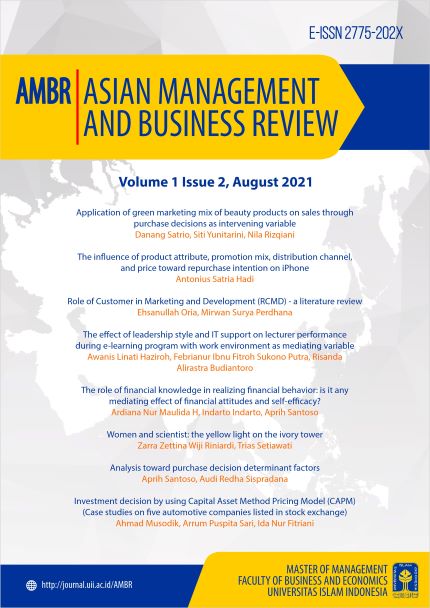Main Article Content
Abstract
The study purposes were to understand the background of women scientist (WS) in studying science, what motivate them to choose science and technology field, exploring their achievement, understanding their social support, exploring their problems. This research was qualitative case study approach. The key informant were four who come from Industrial Engineering and Mathematics and Science Faculty of Universitas Islam Indonesia. The data collection method used depth interviews, observation and documentation. The data test method used triangulation while analysis uses reduction-display-conclusion. The research found that WS studied science because of their interest of internal factor and the environment role of external factor. Their motives also gave benefit for others and increase their networking that is bit similar to McClelland’s Theory. WS had high excellent achievement in functional and structural positions, they received awards from their university until international award which are related to their research result. They also occupied important university structural position. They faced role conflict problem which similar to Greenhaus and Beutell (1985) Theory which increase their behavior changing. They faced marginalization because of their marital status and fear of success tendency which are losing cooking skills and having risk of not having friends which similar to Shaw and Costanzo (1982) Theory.
Keywords
Article Details
Authors who publish with this journal agree to the following terms:
- Authors retain copyright and grant the journal right of first publication with the work simultaneously licensed under a Creative Commons Attribution-ShareAlike 4.0 International License that allows others to share the work with an acknowledgement of the work's authorship and initial publication in this journal.
- Authors are able to enter into separate, additional contractual arrangements for the non-exclusive distribution of the journal's published version of the work (e.g., post it to an institutional repository or publish it in a book), with an acknowledgement of its initial publication in this journal.
- Authors are permitted and encouraged to post their work online (e.g., in institutional repositories or on their website) prior to and during the submission process, as it can lead to productive exchanges, as well as earlier and greater citation of published work (See The Effect of Open Access).
